Confidence is more than just a feeling; it’s a powerful tool that can unlock your full potential. It’s the belief in your abilities, judgment, and worth. When you’re confident, you’re more likely to take risks, pursue your passions, and overcome challenges. Yet, building confidence can be a journey. It requires self-awareness, practice, and a willingness to step outside your comfort zone.
This guide explores a range of practical strategies to help you boost your confidence. From cultivating a positive mindset to mastering essential skills, these techniques are designed to empower you. Remember, confidence is not about being perfect; it’s about believing in your ability to learn, grow, and adapt.
By implementing these strategies consistently, you can develop a strong sense of self-assurance that will positively impact every area of your life. Let’s embark on this journey together and discover the transformative power of confidence.
Mindset and Self-Belief
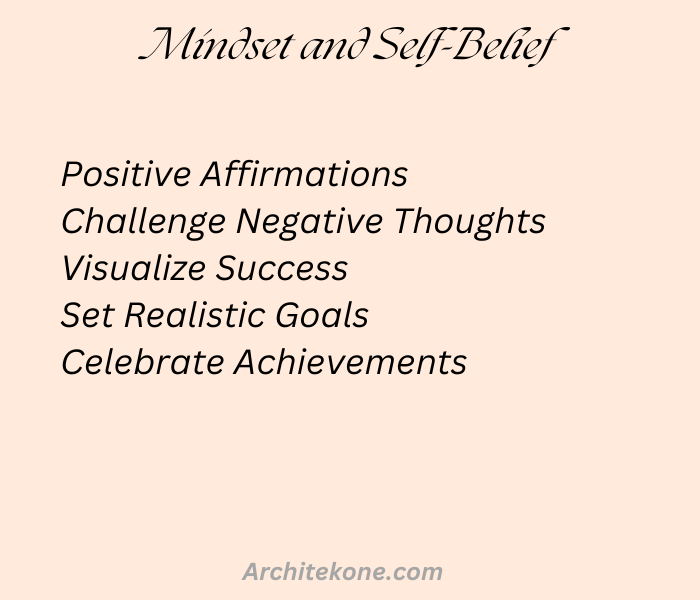
Positive Affirmations
Harness the power of your mind with positive affirmations. These statements, when repeated regularly, can rewire your subconscious and instill a sense of belief and confidence. Craft affirmations that align with your goals and aspirations. For instance, instead of a generic statement, personalize it: “I am a capable and determined individual who is steadily progressing towards my goals.”
Challenge Negative Thoughts
Negative thoughts are often habitual but not inevitable. When faced with self-doubt or pessimism, challenge these thoughts consciously. Question their validity and replace them with more constructive and empowering perspectives. This mental exercise strengthens your resilience and fosters a growth mindset.
Visualize Success
Mental imagery is a potent tool for achieving goals. By vividly visualizing your desired outcomes, you prime your brain for success. Engage your senses in this process. See yourself accomplishing your objectives, hear the cheers of support, and feel the sense of accomplishment. Regular visualization enhances motivation and focus.
Set Realistic Goals
Goal setting provides direction and purpose. Establish clear, specific, and measurable goals that align with your values and aspirations. Break down larger objectives into smaller, actionable steps to avoid feeling overwhelmed. Celebrate each milestone to maintain momentum and reinforce your belief in your abilities.
Celebrate Achievements
Recognizing and appreciating your progress is essential for sustained motivation. Celebrate your successes, no matter how small. This positive reinforcement strengthens your self-efficacy and creates a cycle of accomplishment. Share your achievements with others to amplify their impact and build a support system.
Skill Building and Competence
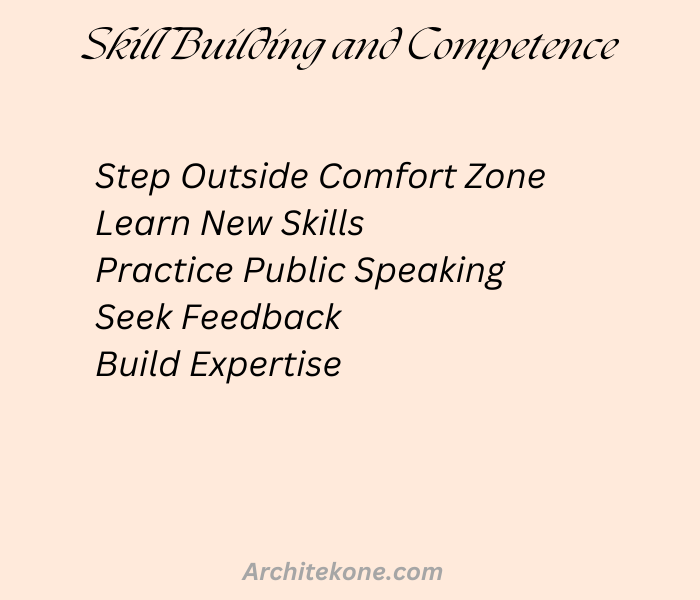
Step Outside Your Comfort Zone
Expanding your horizons and challenging yourself is essential for growth. By venturing into unfamiliar territories, you open yourself up to new experiences, perspectives, and opportunities. This can lead to increased creativity, problem-solving abilities, and resilience.
Learn New Skills
Continuous learning is the cornerstone of personal and professional development. Acquiring new skills not only enhances your capabilities but also boosts your confidence and adaptability. Identify areas where you want to improve and invest time in acquiring the necessary knowledge and expertise.
Practice Public Speaking
Effective communication is a vital skill in today’s world. Overcoming the fear of public speaking can significantly impact your career and personal life. Regular practice, whether through formal training or informal opportunities, can help you develop confidence, clarity, and persuasiveness.
Seek Feedback
Constructive criticism is invaluable for growth. Actively seeking feedback from others can provide insights into your strengths and weaknesses. Use this information to identify areas for improvement and refine your skills.
Build Expertise
Specializing in a particular field can set you apart from the competition. By focusing on a specific area of interest, you can develop deep knowledge and become a sought-after expert. This can lead to increased opportunities and career advancement.
Personal Growth and Development
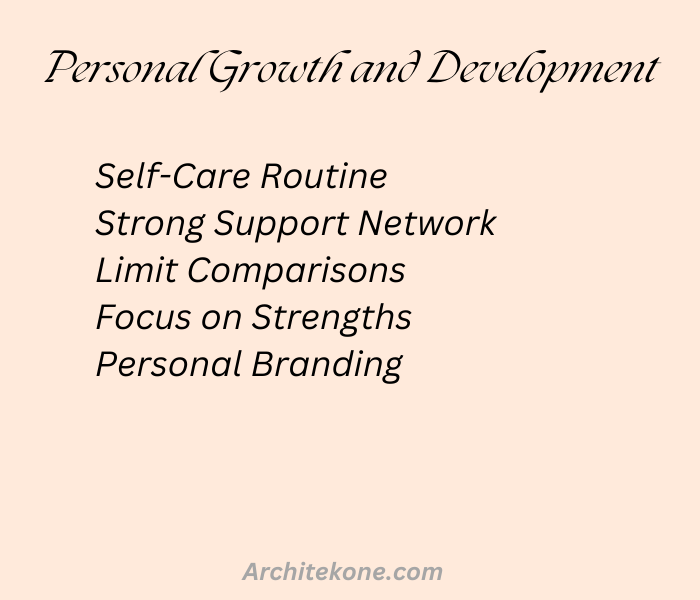
Self-Care Routine
Nourish your mind, body, and soul. Create a personalized self-care routine that includes relaxation techniques, physical activity, healthy eating, and sufficient sleep. Make time for hobbies, spend quality time in nature, and practice mindfulness. Remember, self-care isn’t selfish; it’s essential.
Strong Support Network
Surround yourself with positive and uplifting people who believe in you. Build genuine connections, offer support, and be open to receiving it. A strong support network provides encouragement, perspective, and a sense of belonging.
Limit Comparisons
Focus on your own journey and progress. Comparing yourself to others can be detrimental to your self-esteem. Celebrate your unique strengths and accomplishments. Remember, everyone’s path is different.
Focus on Strengths
Identify and cultivate your natural talents and abilities. Building on your strengths boosts confidence and creates opportunities for growth. Don’t be afraid to showcase your unique qualities.
Personal Branding
Discover your authentic self and communicate your value effectively. Define your personal brand based on your passions, skills, and values. Build a strong online presence, network strategically, and consistently deliver on your promises. Remember, your personal brand is your reputation.
Overcoming Challenges and Doubts
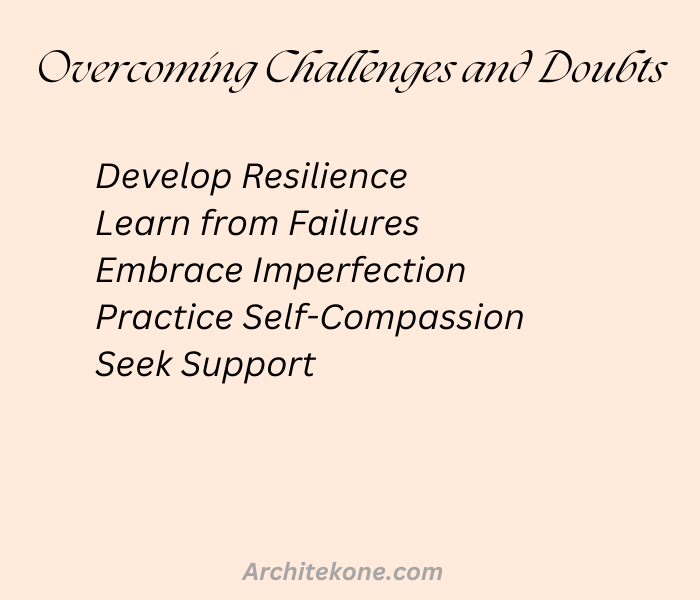
Develop Resilience
Resilience is the cornerstone of overcoming adversity. It’s the ability to bounce back, adapt, and grow in the face of challenges. To cultivate resilience, focus on developing emotional strength, flexibility, and a positive outlook. View obstacles as opportunities for growth, and practice mindfulness to build inner strength.
Learn from Failures
Failure is not a dead end; it’s a detour on the road to success. Rather than dwelling on setbacks, embrace them as valuable learning experiences. Analyze what went wrong without self-blame, identify key lessons, and apply them to future endeavors. Adopting a growth mindset, which believes abilities and intelligence can be developed through dedication and hard work, is crucial for transforming failures into stepping stones.
Embrace Imperfection
The pursuit of perfection is often counterproductive and can lead to unnecessary stress and disappointment. Accepting your flaws and imperfections is a sign of self-awareness and authenticity. Shift your focus from achieving unattainable ideals to celebrating progress and growth. By embracing imperfection, you create space for genuine connections and self-compassion.
Practice Self-Compassion
Treat yourself with the same kindness and understanding you would offer a friend. Self-compassion involves acknowledging your struggles without self-criticism. It’s about recognizing that everyone experiences challenges and setbacks. By nurturing a positive self-image and practicing self-forgiveness, you build resilience and emotional well-being.
Seek Support
A strong support network is essential for navigating life’s challenges. Surround yourself with people who uplift and encourage you. Reach out to friends, family, or mental health professionals who can offer guidance, empathy, and a listening ear. Sharing your experiences with others can provide valuable perspective, reduce feelings of isolation, and foster a sense of belonging. Remember, seeking support is a sign of strength, not weakness.
Action-Oriented Steps
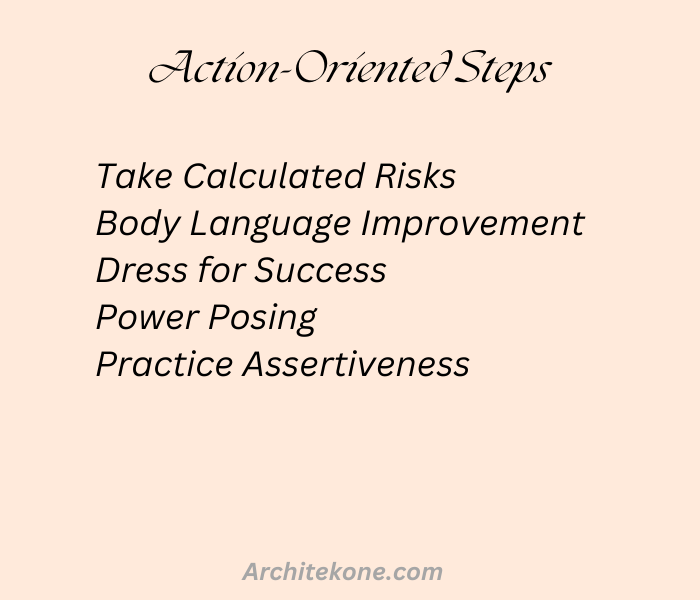
Take Calculated Risks
Make informed decisions by carefully evaluating potential risks and rewards. Develop contingency plans to mitigate unforeseen challenges. Cultivate a growth mindset that embraces failure as a learning opportunity. Seek out new experiences and challenges to expand your skill set and knowledge base.
Body Language Improvement
Project confidence and openness through your physical presence. Utilize gestures intentionally to emphasize key points and enhance communication. Maintain consistent eye contact to build trust and rapport with others. Practice active listening by fully engaging with the speaker and providing thoughtful responses.
Dress for Success
Create a professional and polished image through carefully selected attire. Pay meticulous attention to grooming and personal hygiene to convey a sense of competence. Align your wardrobe with the expectations and culture of your workplace or industry.
Power Posing
Enhance your confidence and authority by adopting expansive and open body postures. Practice power poses in private before high-stakes situations to prime your mind and body. Utilize the psychological benefits of power posing to improve performance and decision-making.
Practice Assertiveness
Communicate your thoughts, needs, and opinions with clarity and conviction. Establish healthy boundaries while respecting the rights and perspectives of others. Build self-esteem and self-belief to project confidence and assertiveness. Develop effective communication skills to express yourself assertively in various situations.
Final Thoughts
Building confidence is a lifelong journey that requires dedication and self-awareness. By incorporating the strategies outlined in this guide, you can take significant strides toward unlocking your full potential. Remember, small, consistent steps can lead to remarkable transformations.
It’s essential to find what works best for you and to celebrate your progress along the way. Everyone’s path to confidence is unique, so be patient with yourself and embrace challenges as opportunities for growth.
Ultimately, confidence is about believing in your abilities and worthiness. By nurturing a positive mindset, taking calculated risks, and developing essential skills, you can cultivate a strong sense of self-assurance that empowers you to achieve your goals.

